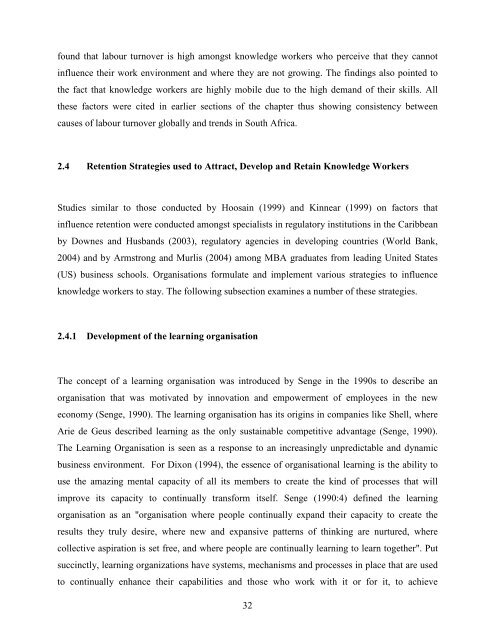Thami Nompula MBA Dissertation March 2007 - Rhodes eResearch ...
Thami Nompula MBA Dissertation March 2007 - Rhodes eResearch ...
Thami Nompula MBA Dissertation March 2007 - Rhodes eResearch ...
Create successful ePaper yourself
Turn your PDF publications into a flip-book with our unique Google optimized e-Paper software.
found that labour turnover is high amongst knowledge workers who perceive that they cannot<br />
influence their work environment and where they are not growing. The findings also pointed to<br />
the fact that knowledge workers are highly mobile due to the high demand of their skills. All<br />
these factors were cited in earlier sections of the chapter thus showing consistency between<br />
causes of labour turnover globally and trends in South Africa.<br />
2.4 Retention Strategies used to Attract, Develop and Retain Knowledge Workers<br />
Studies similar to those conducted by Hoosain (1999) and Kinnear (1999) on factors that<br />
influence retention were conducted amongst specialists in regulatory institutions in the Caribbean<br />
by Downes and Husbands (2003), regulatory agencies in developing countries (World Bank,<br />
2004) and by Armstrong and Murlis (2004) among <strong>MBA</strong> graduates from leading United States<br />
(US) business schools. Organisations formulate and implement various strategies to influence<br />
knowledge workers to stay. The following subsection examines a number of these strategies.<br />
2.4.1 Development of the learning organisation<br />
The concept of a learning organisation was introduced by Senge in the 1990s to describe an<br />
organisation that was motivated by innovation and empowerment of employees in the new<br />
economy (Senge, 1990). The learning organisation has its origins in companies like Shell, where<br />
Arie de Geus described learning as the only sustainable competitive advantage (Senge, 1990).<br />
The Learning Organisation is seen as a response to an increasingly unpredictable and dynamic<br />
business environment. For Dixon (1994), the essence of organisational learning is the ability to<br />
use the amazing mental capacity of all its members to create the kind of processes that will<br />
improve its capacity to continually transform itself. Senge (1990:4) defined the learning<br />
organisation as an "organisation where people continually expand their capacity to create the<br />
results they truly desire, where new and expansive patterns of thinking are nurtured, where<br />
collective aspiration is set free, and where people are continually learning to learn together". Put<br />
succinctly, learning organizations have systems, mechanisms and processes in place that are used<br />
to continually enhance their capabilities and those who work with it or for it, to achieve<br />
32

















